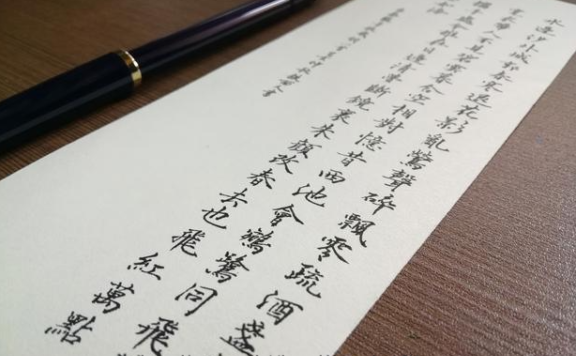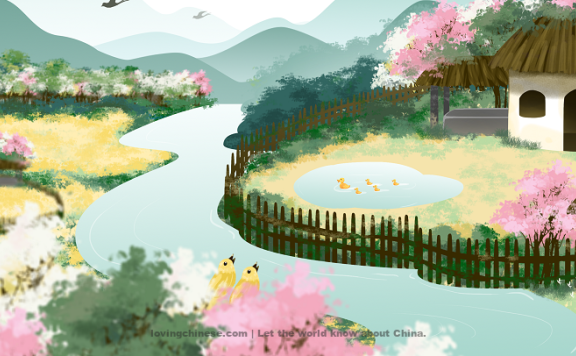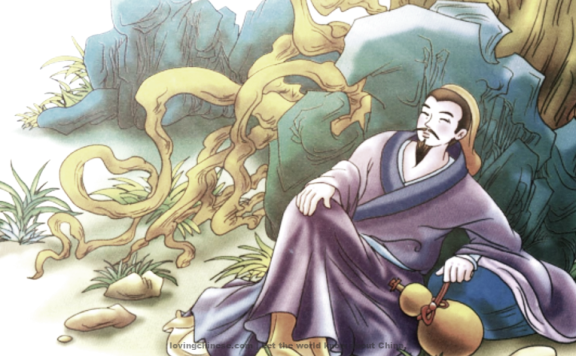-
Qin Guan: Rouged Lips ~ 《点绛唇·醉漾轻舟》 秦观 with English Translations
"Dian Jiang Lip: Drunken Boat" is a work by Qin Guan, a poet of the Song Dynasty. This poem borrows the story of Liu Chen and Ruan Zhao entering Tiantai in Liu Yiqing's "Records of the Underworld", implying the bitterness of yearning for the fairyland but having no way out. The first part starts with the emotion in the scenery, the scene is beautiful, and then suddenly turns, the emotion is sad; the second part first goes on and goes deeper, the scenery is bleak, and then the scenery fades out, the emotion is sad. The whole poem begins with a soft and beautiful style, and ends with the style of scenery and emotion. It is written to express emotion in the scenery, the emotion is deep, the meaning is tortuous and implicit, and it is thought-provoking. 《点绛唇·醉漾轻舟》是宋代词人秦观的作品。此词借刘义庆《幽明录》载刘晨、阮肇入天台故事,隐寓向往仙境而天涯无路的苦境。上片起笔寓情于景,境界清丽,接着忽而转折,情辞悲苦;下片先承上深入,浑化无迹,景色惨淡,继又景语淡出,情辞凄楚。全词以轻柔优美的笔调开端,以景语情语的笔法收篇,写来寓情于景,情蕴意深,委曲含蓄,耐人寻味。 《点绛唇·醉漾轻舟》 秦观 醉漾轻舟,信流引到花深处。尘缘相误,无计花间住。烟水茫茫,千里斜阳暮。山无数,乱红如雨,不记来时路。 Rouged Lips Qin Guan Drunk, I let my light boatAlong the river float,Seduced to the depth of the flowers.Not freed from worldly care,I cannot stay long here.The mist-veiled hill and rillAre steeped for miles and miles in the sun's parting ray.From hill to hillThe reds are falling in showers.I can't remember my homeward way.- 87
- 0
-
Qin Guan: Song of Flirtation ~ with English Translations
The ten poems of "Diao Xiao Ling" are representative works of Qin Guan, a famous poet in the Northern Song Dynasty. The ten poems sing about ten beauties in ancient times, and each poem is preceded by a short poem of seven words, which is generally called "Zhi Yu". 《调笑令》十首是北宋著名词人秦观的代表作品。十首分咏古代十个美女,每首之前冠以一首七言短诗,一般称之为“致语”。 秦观·《调笑令》 柳岸水清浅,笑折荷花呼女伴。盈盈日照新妆面。水调空传幽怨,扁舟日暮笑声远,对此令人肠断。 Song of Flirtation Qin Guan By willow-shaded shores water's shallow and clear;Lotus-picking maidens call their laughing mates dear.Their newly made-up faces outshine the beaming sun.Their water melodies in vain awakeMy hidden sorrows one by one.When laughters in their leaf-like boat fade far awayBy the end of the day,How can my heart not break?- 84
- 0
-
Qin Guan: Return of the Lover ~ 秦观·《阮郎归》 with English Translations
"Ruan Lang Gui" is a poem written by Qin Guan, a poet of the Northern Song Dynasty. The first part of the poem describes waking up from a dream on a cold night, feeling only the deep courtyard, hearing the music of the borderland coming from the gate of the city tower, and the long and clear night has passed. It reflects the bleak predicament of being exiled. The second part describes the loneliness and resentment of wandering in a foreign land. The fact that there was no letter from relatives on New Year's Eve is exactly what caused the longing in the dream and the sadness of the broken dream. The end of the poem truly describes the author's loneliness in the exile, with no relatives and unbearable loneliness. The whole poem is exquisitely written, with appropriate allusions, and the scenery, emotions, simple words, and plain words are subtle and clever, with profound meaning. 《阮郎归》是北宋词人秦观所写的一首词。该词上片写寒夜梦醒,只感觉庭院深深,听到城楼门头传来阵阵边地乐曲,漫长的清夜又过去了。反映了羁居贬所的凄凉困境。下片就梦断写异乡飘泊的孤独幽怨。除夕时节还没有见亲人来信,正是引发梦中相思及梦断悲苦的原因。词尾真实地写出作者身在贬所,举目无亲,孤寂难耐的况味。全词笔触精致,用典贴切,景语、情语、浅语、淡语,含蓄巧妙,意味深远。 秦观·《阮郎归》 湘天风雨破寒初,深沈庭院虚。丽谯吹罢小单于,迢迢清夜徂。乡梦断,旅魂孤,峥嵘岁又除。衡阳犹有雁传书,郴阳和雁无。 Return of the Lover Qin Guan The cold of Southern sky dissolves into wind and rain;The courtyard's deep in vain.From the watchtowers wafts the young prince's song.How the dreary night appears long!I wake from dreamsOf native streams;All I feel onlyMy soul so…- 81
- 0
-
Qin Guan: Dreamlike Song ~ 秦观·《如梦令·池上春归》 with English Translations
"Ru Meng Ling: Spring Returns on the Pond" is a lyric by Qin Guan, a writer in the Song Dynasty. The two lines "on the pond" describe the scene seen in the daytime. The two words "spring returns" secretly contrast the fact that people do not return; "falling flowers and flying catkins" not only express the usual sadness of spring, but also express the sigh of a rough life experience, which is full of emotion. The two lines "the lonely house" describe the deserted and lonely environment of the hostel and what is seen in the dream. "The moon embankment return road" is the focus of this lyric, which carries on the "spring return" in the verse, points out the main theme of the lyric, and then completes the structural transition from "spring return" to "people return", with strict composition. The three lines "without thread" are lyrical. The line "outside the curtain" not only expresses the emotion through the scene, but also explains the reason for waking up from the dream. At this point, a picture of a lonely house with no emotion and no thread in the night rain is clearly displayed. The whole lyric expresses the author's desolate…- 72
- 0
-
Qin Guan: Ru Meng Ling ~ 秦观·《如梦令·莺嘴啄花》 with English Translations
"Ru Meng Ling: Oriole's Beak Pecking Flowers" is a poem written by Qin Guan, a poet of the Northern Song Dynasty. It expresses the author's feelings of missing someone due to the sadness of spring by describing every scene and object of spring. 《如梦令·莺嘴啄花》是北宋词人秦观所作的词,通过描写了春天的一景一物,表达作者因伤春而作怀人的感情。 秦观·《如梦令·莺嘴啄花》 莺嘴啄花红溜,燕尾点波绿皱。指冷玉笙寒,吹彻小梅春透。依旧,依旧,人与绿杨俱瘦。 Ru Meng Ling Qin Guan The oriole pecks the red flowersThat are wet with dew;The swallow skims the pond, its tailBreaking the water into green wavelets.The cold fingers play on the cold reedsThat produce the Spring’s hymn—The Little Mei Flowers.Things remain the same as yore:To a shadow the love-sick soul is worn,Even as the green willows are.- 70
- 0
-
Qin Guan: Ru Meng Ling ~ with English Translations
"Ru Meng Ling: The Night is Deep" is a poem written by Qin Guan, a poet of the Northern Song Dynasty. This poem describes the hardships of the journey by describing the feeling of staying overnight in an inn, and describes the loneliness and desolation of the journey and the coldness and bleakness of the inn in a way that makes the reader feel as if they are there. There is no sentence in the poem that involves the author's own mood. The author conveys his inner thoughts through his feelings about the environment and direct description of the scene. The night is like water, which is an association, the wind blowing in the inn is heard, the mouse peeping at the lamp is seen, and the cold air invading the quilt is felt. The layers of superposition create a unique atmosphere. 《如梦令·遥夜沉沉》是北宋词人秦观创作的一首词。此词借写夜宿驿舍的况味,诉说旅途的艰辛,把旅途的孤独凄清和驿亭的寒冷萧瑟描写得让人读来如临其境。词里没有一句涉及作者本人的心情,作者是通过对环境的感受以及直接对情景的描写来传达内心。夜色如水是联想,风吹驿亭是耳闻,老鼠窥灯是目见,寒气侵被是身受,层层叠加,气氛顿出,可谓别具特色。 秦观·《如梦令·遥夜沉沉》 遥夜沉沉如水,风紧驿亭深闭。梦破鼠窥灯,霜送晓寒侵被。无寐,无寐,门外马嘶人起。 Ru Meng Ling Qin Guan The long night is draggy like water.The wind sharp, the stage coach inn has its doors shut tight.Starting from a dream, I see a mouse peering by the lamp.The morning chill, borne by frost,Invades my bedding.No rest.No rest.Outside, horses neigh, people rising.- 81
- 0
-
Qin Guan: Huan Xi Sha ~ 秦观·《浣溪沙·漠漠轻寒》 with English Translations
Qin Guan's "Huanxisha: Momoqinghan" is a poem written by Qin Guan, a poet in the Northern Song Dynasty. The first part of the poem mentions the time, place, and climate through people's feelings. The heroine climbs the tower alone in the spring morning; the second part directly describes the melancholy of spring, comparing the flying flowers to dreams and the drizzle to melancholy, which points out the main theme. The author uses the "light touch" writing method to blend emotions into the scenery, and the artistic conception is quiet and leisurely. The color tone is light and faint, implicit and tasteful. 秦观·《浣溪沙·漠漠轻寒》是北宋词人秦观创作的一首词。词的上片通过人的感受点名了时间、地点、气候,女主人公在春天的早晨独自登楼;下片正面描写春愁,将飞花比作梦,将细雨比作愁,点明了主旨。作者用“轻描淡写”的笔法,融情入景,意境怅静悠闲,色调轻浅幽渺,含蓄有味。 秦观·《浣溪沙·漠漠轻寒》 漠漠轻寒上小楼,晓阴无赖似穷秋,淡烟流水画屏幽。自在飞花轻似梦,无边丝雨细如愁,宝帘闲挂小银钩。 Huan Xi Sha Qin Guan Ascending the small pavilion in the light chill mist,Clouds at daybreak, like a weary autumn day;A pale haze and dark winding stream painted on screens.Falling petals, leisurely, carefree, as in a dream;The endless rain, sad as my grief at parting;While pearl curtains hang idle on silver hooks.- 80
- 0
-
Qin Guan: Shortened Form of Magnolia Flower ~ 秦观·《减字木兰花》 with English Translations
The poem "Reduced Words Mulan Flower" expresses the melancholy and sorrow of a woman who misses her lover far away. The whole poem is told by the woman herself, with the word "sorrow" running through it. "The end of the world" indicates that the woman is far away, and "old hatred" indicates that they have been separated for a long time. These four words describe the gap in space and time. 《减字木兰花》这首词抒写了闺中思妇念远怀人的忧郁愁情。全词托思妇自诉口吻,以“愁”字贯串始终。“天涯”点明所思远隔,“旧恨”说明分离已久,四字写出空间、时间的悬隔。 秦观·《减字木兰花》 天涯旧恨,独自凄凉人不问。欲见回肠,断尽金炉小篆香。黛蛾长敛,任是春风吹不展。困倚危楼,过尽飞鸿字字愁。 Shortened Form of Magnolia Flower Qin Guan Gnawed by parting grief as of old,O who would care for me, lonely and cold?If you want to know my broken heart,Just see the incense from golden censer part!My eyebrows ever knit,No vernal breeze can smooth them, not a bit.Weary, I lean on tower high.What do I see but grievous wild geese passing by!- 54
- 0
-
Qin Guan Poem:Riverside Daffodils – 秦观《临江仙·千里潇湘挼蓝浦》
“Riverside Daffodils” is a poem written by Qin Guan in the Northern Song Dynasty.- 52
- 0
-
Qin Guan Poem: Courtyard Full of Fragrance – 秦观《满庭芳·山抹微云》
满庭芳 秦观 山抹微云,天连衰草,画角声断谯门[1]。暂停征棹,聊共引离尊[2]。多少蓬莱旧事[3],空回首、烟霭纷纷。斜阳外,寒鸦万点,流水绕孤村。销魂当此际,香囊[4]暗解,罗带[5]轻分。谩赢得、青楼薄幸[6]名存。此去何时见也,襟袖上、空惹啼痕。伤情处,高城望断,灯火已黄昏。 注释:[1]谯门:谯楼之门,古时在城门上建楼用以瞭望,上为楼,下为门。一说即鼓楼之门,古代以更鼓表示时间。[2]离尊:指送别之酒宴。[3]蓬莱旧事:相传秦观有一次应邀在蓬莱阁参加会稽太守程辟的宴会时,认识了一个女子,不能忘情,故曰“蓬莱旧事”。[4]香囊:男女间定情之物。[5]罗带:古人以结带表示相爱。[6]薄幸:薄情。唐杜牧有诗曰:“十年一觉扬州梦,赢得青楼薄幸名。” Courtyard Full of Fragrance Qin Guan A belt of clouds girds mountains highAnd withered grass spreads to the sky.The painted horn at the watchtower blows.Before my boat sails up,Let's drink a farewell cup.How many things do I recall in bygone days,All lost in mist and haze!Beyond the setting sun I see but dots of crowsAnd that around a lonely village water flows.I'd call to mind the soul-consuming hourWhen I took off your perfume purse unseenAnd loosened your silk girdle in your bower.All this has merely won me in the Mansion GreenThe name of fickle lover.Now I'm a rover,O when can I see you again?My tears are shed in vain;In vain they wet my sleeves.It grievesMy heart to find your bower out of sight;It's lost at dusk in city light. Notes:The poet writes this lyric for his beloved songstress in the Green Mansion. 《满庭芳·山抹微云》是宋代词人秦观的词作。此词虽写艳情,却能融入仕途不遇,前尘似梦的身世之感。上阕写景,引出别意,妙在“抹”与“连”两个动词表现出风景画中的精神,显出高旷与辽阔中的冷峻与衰飒,与全词凄婉的情调吻合。接着将“多少蓬莱旧事”消弥在纷纷烟霭之中,概括地表现离别双方内心的伤感与迷茫。“斜阳外”三句宕开写景,别意深蕴其中。下阕用白描直抒伤心恨事,展示自己落拓江湖不得志的感受。全词写景、抒情汇为一气,错综变化,脍炙人口。 The lyrics of "Courtyard Full of Fragrance" are written by Qin Guan, a lyricist of the Song Dynasty. Although this lyric is about eroticism, it can be integrated with the feeling of life and death, which is like a dream in the past. In the first section, he writes about the scenery and…- 14
- 0
-
Qin Guan Poem: A Thousand Autumns – 秦观《千秋岁·水边沙外》
Qianqiu Sui, Beyond the Sand by the Water, was written by Qin Guan, a poet in the Song Dynasty.- 21
- 0
-
Qin Guan Poem: Watching the Tidal Bore – 秦观《望海潮·洛阳怀古》
The song "Watching the Tidal Bore" is a poignant and nostalgic lyric written by Qin Guan, a lyricist of the Northern Song Dynasty.- 24
- 0
-
Qin Guan Poem: Song of Pilgrimage – 秦观《行香子·树绕村庄》
"Song of Pilgrimage" is a lyric composed by Qin Guan, a lyricist of the Northern Song Dynasty.- 19
- 0
-
Qin Guan Poem: Treading on Grass – 秦观《踏莎行》
"Treading on Grass" is a lyric by Qin Guan, a Song Dynasty lyricist. It was written in March of the fourth year of Shaosheng (1097), when the writer first arrived in Chenzhou (now in Hunan).- 20
- 0
-
Qin Guan Poem: Immortals at the Magpie Bridge – 秦观《鹊桥仙·纤云弄巧》
The Magpie Bridge Fairy is a lyric by Qin Guan of the Song Dynasty.- 31
- 0
-
Qin Guan Poem: Riverside Town – 秦观《江城子·西城杨柳弄春柔》
"Riverside Town" is a lyric by Qin Guan of the Song Dynasty. It is a poem about parting hatred in late spring.- 36
- 0
-
Qin Guan Poem: Song of Good Event · In Dream – 秦观《好事近·梦中作》
The song "Song of Good Event · In Dream" is a lyric composed by Qin Guan, a lyricist of the Northern Song Dynasty.- 13
- 0
-
Qin Guan Poem: Rouged Lips – 秦观《点绛唇·桃源》
The first piece is about a lyricist of the Song Dynasty, Qin Guan.- 15
- 0
-
Qin Guan: Queqiaoxian
鹊桥仙 秦观 纤云弄巧, 飞星传恨, 银汉迢迢暗渡。 金风玉露一相逢, 便胜却人间无数。 柔情似水, 佳期如梦, 忍顾鹊桥归路。 两情若是久长时, 又岂在朝朝暮暮。 Queqiaoxian Qin Guan Clouds have their peculiar flair and skill; They can change their size and shape, as they will. Stars have qualities more wonderful still; The hopes of their fellows, they can fulfill, In those celestial regions, high above, As links for one star to approach her love, They help “Lassie” to cross the Milky Way, To see her “Laddie” once a year, this day. Their love is like heavenly dew for gods to drink. To the human level, it would never sink. One rendezvous between them is of more worth – Than countless such as we have on this, our earth. Their love is constant, as water is, in its flow. Their lover’s meeting is short, as sweet dreams go. How she bears the sight of Magpie Bridge without a tear, Which Marks their separation for another year! Since their affection is something that endure, Must they bill and coo as daily renewer? (徐忠杰 译) Immortals at the Magpie Bridge Qin Guan Clouds float like works of art, Stars shoot with grief at heart. Across the Milky Way the… -
Qin Guan: The Seventh Night of the Seventh Moon
鹊桥仙 秦观 纤云弄巧, 飞星传恨, 银汉迢迢暗渡。 金风玉露一相逢, 便胜却人间无数。 柔情似水, 佳期如梦, 忍顾鹊桥归路。 两情若是久长时, 又岂在朝朝暮暮。 The Seventh Night of the Seventh Moon Qin Guan (Herd Boy) The soft clouds make decorations, The shooting stars play harbinger, – Far across the Silver River you secretly come to me. Though only once a year we meet in the time of sharp wind and chill dew, We are many times happier than the lovers on earth. (Weaving Girl) Our feelings are tender as water, Our meeting is sweeter than a dream; It is hard for me to look back on the homeward path from the Blackbirds Bridge. But if our love for each other will long endure, It makes no difference that we do not live together day and night. (初大告 译)- 128
- 0
-
Qin Guan: Courtyard Full of Fragrance ~ 《满庭芳》 秦观 with English Translations
小编导读:《满庭芳·山抹微云》是秦观最杰出的词作之一。此词虽写艳情,却能融入仕途不遇,前尘似梦的身世之感。而且词中写景、抒情汇为一气,错综变化,脍炙人口。上阕写景,引出别意,妙在“抹”与“连”两个动词表现出风景画中的精神,显出高旷与辽阔中的冷峻与衰飒,与全词凄婉的情调吻合。接着将“多少蓬莱旧事”消弥在纷纷烟霭之中,概括地表现离别双方内心的伤感与迷茫。“斜阳外”三句宕开写景,别意深蕴其中,下阕用白描直抒伤心恨事,展示自己落拓江湖不得志的感受。 《满庭芳》 秦观 山抹微云, 天连衰草, 画角声断谯门。 暂停征棹, 聊共引离尊。 多少蓬莱旧事, 空回首, 烟霭纷纷。 斜阳外, 寒鸦万点, 流水绕孤村。 销魂当此际, 香囊暗解, 罗带轻分。 谩赢得青楼, 薄幸名存。 此去何时见也, 襟袖上, 空惹啼痕。 伤情处, 高城望断, 灯火已黄昏。 Courtyard Full of Fragrance Qin Guan A belt of clouds girds mountains high And withered grass spreads to the sky. The painted horn at the watchtower blows. Before my boat sails up, Let's drink a farewell cup. How many things do I recall in bygone days, All lost in mist and haze! Beyond the setting sun I see but dots of crows And that around a lonely village water flows. I'd call to mind the soul-consuming hour When I took off your perfume purse unseen And loosened your silk girdle in your bower. All this has merely won me in the Mansion Green The name of fickle lover. Now I'm a rover, O when can I see you again? My tears are shed in vain; In vain they wet my sleeves. It grieves My heart to find your bower out of sight; It's lost at dusk in city light. -
Qin Guan: A Thousand Autumns ~《千秋岁》 秦观 with English Translations
小编导读:《千秋岁·水边沙外》,北宋秦观词作。字面上看,此词以“春”贯穿全篇,“今春”和“昔春”,“盛春”到“暮春”,以时间的跨度,将不同的时空和昔盛今衰等感受融合为一,创造出完整的意境。实质上,该词也将今与昔,政治上的不快和爱情上的失意交织在一起,或谈政治理想破灭,或说个人容颜衰老,反复咏叹,缠绵凄恻,最终落脚点在一无边无际的“愁”上,感情极其忧伤,催人泪下。 《千秋岁》 秦观 水边沙外, 城郭春寒退。 花影乱, 莺声碎。 飘零疏酒盏, 离别宽衣带。 人不见, 碧云暮合空相对。 忆昔西池会, 鵷鹭同飞盖。 携手处, 今谁在? 日边清梦断, 镜里朱颜改。 春去也, 飞红万点愁如海。 A Thousand Autumns Qin Guan Beyond the sandbar by the waterside, Out of the town the spring chill begins to subside. The flowers' shadows running riot, The orioles' warble breaks the quiet.. Lonely, I drink few cups of wine, My belt loosens, for friends I pine. But where are they? In vain clouds gather up at the end of the day. I still remember our Western Pool's rendezvous: Together with our cabs herons and egrets flew. Where we stood hand in hand, Who still stays in the land? My dream can't fly to sunny place; The mirror shows my wrinkled face. Away spring's sped; My grief looks like a sea of failing petals red. -
Qin Guan: The Departure of Spring ~ 《画堂春·落红铺径水平池》 秦观 with English Translations
《画堂春·落红铺径水平池》是北宋词人秦观所作,是作者落第后的写的一首伤春之作。上片写残春之景,暗寓情怀。起拍二句以“落红”、“小雨霏霏”烘托出迷惘、伤感的意绪,继之以“憔悴”、“无奈”点明心事,由隐而显,由景而情,层次分明。下片以抒情为主。过拍“柳外画楼独上”二句以行为描写来传达孤寂、落寞的情怀,“手捻花枝”四字尤其传神。“放花无语对斜晖”二句,一实一虚,将该词的词眼“恨”字徐徐推出,妙造天然。全词蕴藉含蓄,寄情悠远。可谓义蕴言中,韵流弦外,具有言尽而意无穷的余味。 《画堂春·落红铺径水平池》 秦观 落红铺尽水平池, 弄晴小雨霏霏。 杏园憔悴杜鹃啼, 无奈春归! 柳外画楼独上, 凭阑手拈花枝。 放花无语对斜晖, 此恨谁知? The Departure of Spring Qin Guan The falling flowers cover all the paths and water fills the pond. Sporting with the fine weather a light rain drizzles on. The apricot blossoms have faded, leaving the cuckoo to mournfully sing: There is no help for the departure of spring. Lonely I go up the painted pavilion beyond the willow trees; Leaning on the railings I fondle a flower between my fingers, And scatter the petals against the setting sun. Oh! This sorrow of my heart, who knows?
Checking in, please wait...
Click for today's check-in bonus!
You have earned {{mission.data.mission.credit}} points today
My Coupons
-
¥CouponsLimitation of use:Expired and UnavailableLimitation of use:
before
Limitation of use:Permanently validCoupon ID:×Available for the following products: Available for the following products categories: Unrestricted use:Available for all products and product types
No coupons available!
Unverify
Daily tasks completed


























